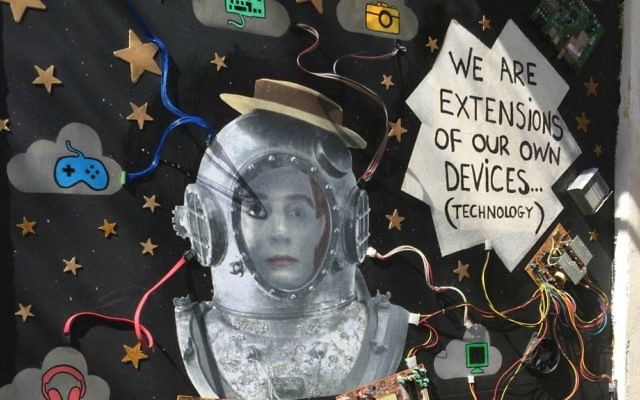Conversations With the Most Distracted Generation
Guest Column by Marita Anderson
Are you ready for the holidays? I don’t know about you, but I rarely feel ready.
When you live the life of a clergy family, this time of year often feels rushed and overwhelming. Even if you are not clergy and are unaware of the enormous effort under way to stage the big Jewish reunion with G-d (or at least your friends), this happens to be one of the busiest months of the year for all of us. We are all jolted out of the summer lull, with little grace, into the routine of late-night meetings, new commitments, homework fights and carpool. As the pace of life accelerates, I begin to notice that I can’t catch my breath, waiting to exhale until after Sukkot.
Over the past few years, the traditional practice of contemplation and spiritual reflection during the month of Elul, the Hebrew month leading up to Rosh Hashanah, has softened the edges of my worries around the High Holidays.
This year I joined an online class with a group of learners attempting to slow things down through the Hasidic practice of Hit’bodedut, which translates as “self-seclusion” or “being alone with oneself.” For several weeks, with the help of a Zoom Room video chat, I made a virtual pilgrimage to hear the teachings of Rebbe Nahman of Breslov, whose modality of Jewish meditation was new to me.
“It is very good to pour out your heart to G-d as you would to a true, good friend,” Reb Nahman said a few centuries ago. And you are not just supposed so say pleasant words of gratitude, but share it all, even your grievances and sorrows.
In my practice, this was a radical concept. What would it be like to pray out loud, talking to G-d without formula, as if speaking to a friend?
Before you decide that you wouldn’t try something that would make you look like a crazy person, think about it. What if we engaged in an ongoing, audible conversation with the divine? What if we shared our thoughts and feelings, unfiltered, as they are?
In many ways, the ritual pageantry of the High Holidays is the opposite experience of a personal quest to know G-d, and so much of the formulaic liturgy can alienate the modern pray-er. Theologically, it’s hard to digest all of the names that are used for G-d over the High Holidays that make us feel separated and small, including Our Father, Our King, Judge and Ruler.
The disturbing nature of communal sin confessions as we beat our chests for transgressions we may have never committed often results in mental gymnastics and deep discomfort. And the reading of the binding of Isaac, with little time to process or ask questions, can render us sleepless for nights to come.
Rabbi Lawrence Hoffman, professor of Hebrew liturgy, whose focus is on making prayer relevant in contemporary times, argues that “we need these prayers now, more than ever,” because they contain ageless wisdom on what it means to be human.
From my perspective, as our plugged-in lives are rapidly changing and we are barely keeping up with the pace, we could certainly use more reminders of what it means to be human. We could use the reminder that our tradition has hundreds of names for G-d for us to choose from, including G-d of Mercy, Grace and Compassion.
The Hasidic masters, who retained the teachings of Hit’bodedut, tell us that the gap between “G-d as friend” and “G-d as King” is an age-old problem. We are not the first generation to wrestle with the disconnect.
However, in the saturated world of sensory overload, we may be the most distracted generation ever. Which means that the distance we have to travel toward a feeling of intimacy and closeness is that much greater. We can’t make the leap in one day.
Rosh Hashanah is also known as Yom Hatruah, or the day of shouting or making noise. With all of the noise of attending synagogue with hundreds, if not thousands, of people and the cacophony of communal prayer, remember to look for the silent pauses to have your private conversation with G-d as an intimate partner. Between the groans and wails of the shofar, there just might be enough space for our hearts’ offering.





comments